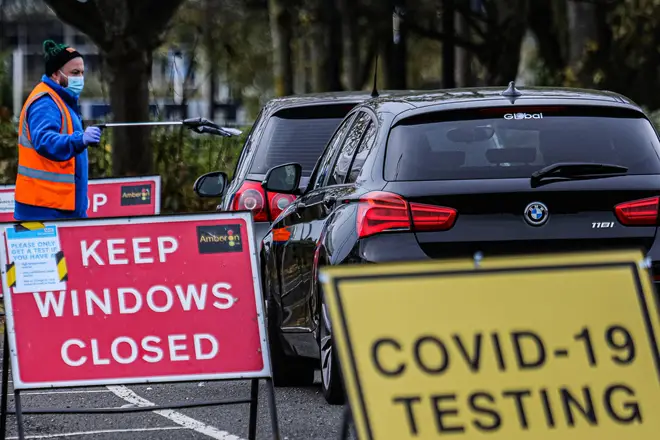
Clive Bull 1am - 4am
23 December 2021, 14:27 | Updated: 7 June 2023, 08:56

More than one million people are estimated to have had coronavirus in the last week in a UK record, new figures have shown.
The Office for National Statistics (ONS) said Covid infection levels have reached record levels, with 1.4 million people estimated to have had the virus in the week up to December 16.
This is the highest number since the autumn of 2020, when comparable figures began.
The ONS said one in 45 people in private households in England were infected with coronavirus in the most recent data, which was up from one in 60 the previous week.
The percentage of people testing positive for Covid-19 in the latest week is estimated to have increased in all regions of England except the North East, South West and West Midlands, where the trend is uncertain, the ONS said.
Read more: PM will wait until after Christmas Day to announce any Covid restrictions for England

Boris Johnson confirms no new measures for Christmas
In London, around one in 30 people was likely to test positive in the week to December 16 - the highest proportion for any region.
The data emerged within hours of Sajid Javid telling broadcasters the Government is not planning to make any more announcements on restrictions in England this week.
It follows a warning from NHS national medical director Professor Stephen Powis that the service is on a "war footing" as the Omicron variant sweeps through the country.
Read more: Prof Adam Finn tells LBC vulnerable people might need a fourth Covid jab

Boris Johnson sets accelerated new year booster target in face of Omicron 'tidal wave'
At the weekend, London mayor Sadiq Khan declared a "major incident" in the capital following a "worrying" number of Omicron cases.
On Saturday, Mr Khan said he was "incredibly worried" about staff absences in frontline services such as police, the NHS and the fire service because of the rapid spread of the new variant.
"The surge in cases of the Omicron variant across our capital is hugely concerning, so we are once again declaring a major incident because of the threat of Covid-19 to our city," said Sadiq Khan.
"The Omicron variant has quickly become dominant with cases increasing rapidly and the number of patients in our hospitals with Covid-19 on the rise again.
"We are already feeling the impact across the capital and while we are still learning about this variant, it's right that London's key agencies work closely together to minimise the impact on our city, including helping to protect the vital vaccination programme."

James O'Brien on those refusing vaccines
However, recent studies have suggested the Omicron variant is "milder" than Delta, with those infected with the new strain less likely to become severely ill.
The UK Health Security Agency (UKHSA) said a booster jab offers a much higher chance of protecting from developing symptoms and ending up in hospital.
But it also warned that it may not be so mild that it won't lead to increased numbers of people in hospital.
Meanwhile, research from Imperial College London indicates that people with PCR-confirmed Omicron are 15 to 20% less likely to need admission to hospital, and 40 to 45% less likely to require a stay of one night or more.
Scientists in a separate Scotland-wide study called Early Pandemic Evaluation and Enhanced Surveillance of Covid-19 have said Omicron is associated with a two-thirds reduction in the risk of hospitalisation compared with Delta.
Researchers have added that although Omicron appears less severe, it is more transmissible partly because the current crop of coronavirus vaccines are less effective against it.